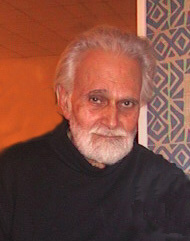Salim sometimes said with astonished gratitude: “It was God who ran after me.” He was referring to a man who would become a dear friend to him and who, on an icy night in December, 1949, had run behind him in a road in London. Salim, who was then a composer of symphonic music (which he wrote under his first name, Edward) wanted to come to Paris and study French music, whose subtlety he found extremely attractive. Someone had spoken to him about a Russian composer who, as it happened, lived in Paris. So, only music was on his mind when he went to the appointment he had arranged with this composer, Thomas de Hartmann. However, after having listened to his music, Hartmann said to him he was leaving for the United States, that, in any case, he had nothing to teach him, and he advised him to go and see Nadia Boulanger instead, an extremely renowned instructor who was teaching in Paris; then he added: “Does spirituality interest you ?”
What is Yoga ?
A Buddha statue
Enlightenment
It was after having intensively meditated for several hours a day and tried to remain as concentrated as possible over the course of his activities of external life, for a little more than four years that he had this experience and at an extraordinary level of intensity. Twenty-five years later, he attempted to communicate what is incommunicable about this enlightenment in his first book, The Way of Inner Vigilance (The Law of Attention):
Afterward, and for many days, his body seemed incredibly light and free, as if transmuted into ether. Something of this sensation has remained with him ever since. He also experienced a strange and indefinable state of well-being, bathed in an ineffable inner stillness, contentment, and indescribable feeling of love hitherto unknown to him, a profound melting tenderness in the solar plexus.
Later, as he tried to formulate into words the strange secret he had discovered concerning life, the stars, and the Universe, he found himself utterly unable to do so. Although the reality of this mysterious comprehension has always stayed with him from that day onward.
Moreover, through this unusual spiritual experience, he had, without having fully understood it at first, received a foretaste and subtle knowledge of the after-death state, a subtle knowledge and higher understanding that have kept silently growing in him, becoming ever clearer, deeper, and more affirmative each time he sat and meditated again.” (chap 40)
To render permanent this awakening
With the same tenacity, the same exactingness and the same passion which filled him as a composer, Salim then invented, in order to remain connected with this other state of being whose inestimable value he had recognized, hundreds of exercises which he applied to all circumstances of life– and which he subsequently transmitted to his students. Through this incessant work on himself, he reached the point “of being so connected to this other state of being and consciousness that, even if he wanted to forget it, he could no longer do so, for this new feeling within him was now an integral part of his nature.” (Fruits on the Path to Awakening chap. 9)
In a realm that goes beyond human understanding, so long as there is a breath of life left, one must ever go forward. There is always more to know and more to understand. ” (The Law of attention, Afterword)
It was out of compassion towards the people who came to see him, and on my insistence, that he agreed to write his first book, The Way of Inner Vigilance, which, owing to his lack of scholastic education, required four years of arduous effort from him. Then, on seeing the difficulties encountered by his students, he got down to writing the subsequent books to help and guide people who, they too, aspired to know the Divine through a direct experience.
The Perception of Time
Death
To inspire the seekers with a little of the inner flame that burned in him
Article published in the magazine Le 3ème Millénaire



